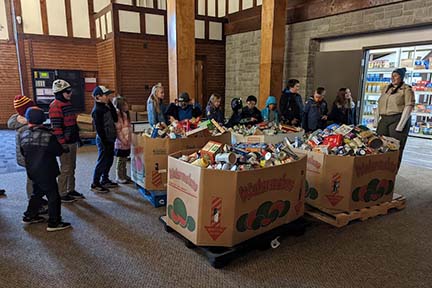
by Becky Andrus | Dec 8, 2021 | Local News, Scouting
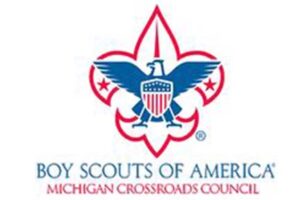
Scouts exceed goal for annual food drive
Scouts with the local Michigan Crossroads Council exceeded their goal for this year’s Scouting for Food drive, assembling 112,732 pounds of food for charities during November.
According to event co-chairman Scott Nehls, approximately 4,600 participants from 152 units across southeastern Michigan helped make the drive a success. Around half a million homes were canvassed across Oakland, Genesee, Wayne and Macomb Counties. Through these door-to-door collection efforts, the youth exceeded their objective of 100,000 pounds as well as the totals collected during their 2020 drive.
“This year the scouts collected 10,000 more pounds than last year,” Nehls said. “I think that shows how vital our work was this year and how giving members of our community are.”
The drive was carried out in partnership with Gleaners Community Food Bank, which operated a number of collection sites with the scouts. Participants were also given the option to donate food to local nonprofits of their choice. A joint effort by Lake Orion Pack 59 and Pack 128 brought in over 2,000 pounds of food for the Woodside Bible Church food pantry.
Project lead Bob DeWar explained that civic service is at the core of Scouting, and the drive helps to educate young people about giving back to the community.
“I’m always so excited to see the Scouts in action during this project,” DeWar said. “As Scouts and adult volunteers deliver and sort countless bags of food, a spirit of cheerful service permeates the collection sites.”
According to DeWar, his youth were surprised to see how much food their neighbors contributed to the drive. However, he said they were even more excited after they dropped the food off at a Gleaners collection site.
“When they arrive at the collection site and see how their one car load combines with hundreds of others to make a much larger impact, their smile tells me they realize they are part of something bigger,” DeWar said.
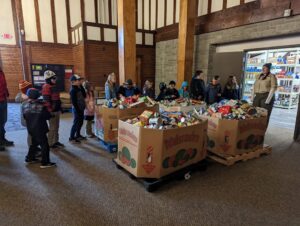
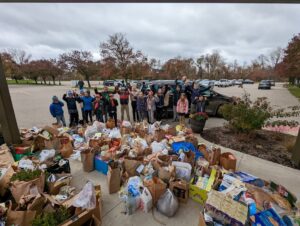
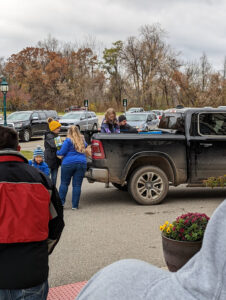

by Becky Andrus | Dec 8, 2021 | Regional News

Governor Whitmer Announces Over 35,000 four-year-olds enrolled in the Great Start Readiness Preschool Program
Spaces remain for children to start preschool in January 2022, governor encourages eligible families to apply
LANSING, Mich. – Today, Governor Whitmer celebrated the bipartisan expansion of the Great Start Readiness Program, or GSRP, Michigan’s homegrown preschool program for four-year-olds. She encouraged families to enroll their children now to start preschool in January 2022. Over 35,000 four-year-olds are enrolled right now.
“Every parent wants the best possible start for their child, and for many families, this includes a high-quality preschool experience,” said Governor Gretchen Whitmer. “Here in Michigan, we are fortunate to have a homegrown program that takes the guesswork out of picking a quality, affordable preschool. The Great Start Readiness Program provides eligible families access to quality, no-cost preschool that works. I’m proud of the progress we’ve made to enroll more four-year-olds and encourage more families to consider this option for their young Michiganders.”
“I appreciate the governor and legislature’s partnership on the funding of universal preschool for all eligible four-year-olds,” said State Superintendent Dr. Michael Rice. “Once fully realized, this effort to add a full year of education for tens of thousands of Michigan children a year will have a profound impact on student outcomes including literacy, graduation and post-secondary attainment rates for decades to come.”
“Our Great Start Readiness Program provides more than 800 Muskegon County children a high-quality preschool experience each year in both public school and private childcare settings,” said Dr. John Severson, Superintendent of Muskegon ISD and Chair of the Instructional Committee at the Michigan Association for Intermediate School Districts. “Outcome data show that ‘graduates’ of local GSRP programs consistently score higher on 3rd-grade assessments than their peers. In addition, a large focus of the GSRP curriculum is placed on developing children’s social skills, which are so crucial for success later in their school careers. GSRP is an invaluable tool in building strong foundations in Muskegon County children.”
“Our partnership with GSRP has helped to bridge major gaps within our organization. We can provide our staff with access to reliable resources, and we can provide competitive pay rates and room to grow within the early childhood industry,” said Monique Snyder, Director of Brainiacs Clubhouse, a child development center in Detroit. “Our parents can breathe more easily knowing that their children are able to attend a high quality educational program without the financial stress that usually yields a program of this magnitude. Most importantly our students have opportunities that are not readily available within our demographics. We value our 7 year partnership with GSRP and can’t wait to see what the future holds!”
Programs are still enrolling, and children can start preschool in January. To be eligible for free preschool, children must be at least four years old by December 1, 2021 and meet income eligibility requirements. Parents can find sites in their community by visiting Michigan.gov/GSRP or calling the Great Start to Quality Resource Center at 877-614-7328.
The expansion is the first of a three-year phase-in which seeks to ensure access to 22,000 additional income-eligible children by the fourth year. Since September, more sites have opened expanding access for children across Michigan—including new sites affiliated with 61 community-based organizations and 21 school districts.
In July, Governor Whitmer signed the school aid budget, which made the largest education investment in state history and eliminated wait lists and expanded access to GSRP for all eligible children. The new investment includes an $121 million in federal funding and $47.5 million from the School Aid Fund, for a total new investment of $168.5 million. Michigan now invests a total of $418 million annually in GSRP.
Investments in preschool pay massive dividends and improve health, educational, and social outcomes for children throughout their education. GSRP not only provides quality early education for young children, it is also good for working families that need more safe, affordable childcare options while they work.
In September, the governor signed the Fiscal Year 2022 budget bill that includes game-changing investments in childcare and delivers on the kitchen-table issues that matter most to families, communities, and small business. The budget puts 167,000 Michiganders on a tuition-free path to higher-education or skills training, repairs or replaces 100 bridges while creating 2,500 jobs, and makes a $500 million deposit into our rainy day fund, the largest one-time ever, bringing its balance to nearly $1.4 billion, the highest ever.
|
by Becky Andrus | Dec 8, 2021 | Recreation
|
|
|
|
 |
Dec. 8, 2021
Contact: Christie Bayus (DNR Grants), [email protected]
Outdoor recreation projects in 14 counties recommended to share $7.7 million in grant funding
The Office of Gov. Gretchen Whitmer today announced that the Michigan Department of Natural Resources has recommended 22 community and state parks, trails and sports facilities to share $7,790,400 in Land and Water Conservation Fund grants. |
|
|
“The Land and Water Conservation Fund is critical to creating quality outdoor recreation resources that add value and improve the quality of life for communities throughout Michigan,” said Gov. Whitmer. “This fund is an excellent example of successful collaboration among federal, state and local government partners that yields health and social benefits for residents and visitors.”
Projects recommended for funding are in Bay, Berrien, Emmet, Ingham, Kent, Mason, Mecosta, Muskegon, Oakland, Oceana, Ontonagon, Otsego, Washtenaw and Wayne counties. That funding will support campground developments, park renovations and improvements, accessible playground development, accessibility improvements and more.
The Land and Water Conservation Fund helps develop public outdoor recreation facilities and provides matching grants for local governments to do the same. The program supports Native American tribes, villages, cities, townships and counties and divisions within the DNR in their efforts to give people better, broader access to quality public outdoor recreation opportunities.
|
|
|

by Becky Andrus | Dec 8, 2021 | Regional News

Gov. Whitmer Announces Michigan Education Trust Lowering Rates for Families to Make College More Affordable
Change will help more Michiganders pursue their potential, help state achieve its broader ‘Sixty by 30’ goal to have 60% of working age adults with postsecondary education or skills
LANSING, Mich. — Governor Gretchen Whitmer today announced that the Michigan Education Trust (MET) is lowering the rates of its contracts so families will realize significant savings the earlier they start saving for a college education.
“Today’s decision by the MET Board lowers costs for working families and helps us put Michiganders first by empowering them to pursue their potential,” said Gov. Whitmer. “On top of Michigan Reconnect, Futures for Frontliners and other initiatives, setting the MET contract prices lower today will help us achieve our Sixty by 30 goal to increase the number of working-age adults with a skill certificate or college degree to 60% by 2030 and put more Michiganders on a path to attain the education and skills they need to get better jobs and earn bigger paychecks. I applaud the MET Board for its action, and I urge any family interested in saving for education to start.”
A prudent investment strategy over the last decade has resulted in a record surplus for the MET which can be used to invest in Michiganders. At their meeting on November 16, the MET Board of Directors unanimously agreed that the surplus should be used to help more Michigan children access a college education that will help them prepare to compete in a modern workforce and solve future challenges. MET last offered reduced pricing in 2007.
“We are constantly striving to deliver to parents, grandparents and others a safe, secure and flexible way to make sure their loved ones meet their higher education goals,” said State Treasurer Rachael Eubanks, who also serves on the MET Board of Directors. “While the new price structure will make it easier for those with young children to save, MET will continue to provide families with older children advantages as they work and plan to help them pursue their dreams.”
“As a dad with three young kids, I know that saving for college is a crucial investment for so many Michigan families,” said Lt. Governor Garlin Gilchrist II. “A good education enriches a student’s life, unlocks better jobs, and results in more lifetime income. Today’s action by the Michigan Education Trust will make it easier for working families to save, helping them share in the prosperity we are working hard to build in Michigan and giving students throughout Michigan a chance to explore and live up to their full potential. Through lower MET contract prices and the fully funded Michigan Reconnect and Futures for Frontliners Programs, Governor Whitmer and I are committed to boosting the number of Michiganders with postsecondary degrees or certificates and helping every Michigander achieve their educational goals.”
In addition, MET will offer a $150 match on the first 200 contracts purchased for new beneficiaries in December. Eligibility and rules are posted at SETwithMET.com along with pricing details. Families who make a MET purchase by December 31 will qualify for a deduction on their 2021 Michigan tax returns.
About the Michigan Education Trust
Administered by the Michigan Department of Treasury, MET lets families pay today’s prices for future higher education costs. Signed into law in 1986, it was the first prepaid tuition program in the nation.
More than 96% of high school graduates participating in MET have attended a college, university or technical school.
There are three types of MET plans: the full benefits plan, the limited benefits plan and the community college plan. Families can purchase one plan or mix and match options.
MET benefits can be used for postsecondary education at universities, colleges and technical schools. If a child chooses to attend a private Michigan school or out-of-state college or university, funds can be directed to that institution. MET benefits may also be transferred to other eligible family members and are refundable if the student does not attend college.
Parents, grandparents or other family and friends can make MET contributions on behalf of beneficiaries. MET has flexible and convenient payment options that allow purchasers to pay as they go, pay all at once or make monthly payments.
Contributions to MET plans are tax deductible on Michigan tax returns. Earnings are tax exempt if they are used for higher education.
More information about MET, including one-on-one consultation sessions with MET experts, is available at SETwithMET.com, 800-MET-4-KID or [email protected].
|
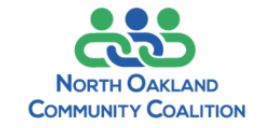
by Becky Andrus | Dec 7, 2021 | Health and Wellness
| The tragedy at Oxford High School last Tuesday was devastating for the whole community, and our hearts go out to the families of the victims, along with all the students, staff, and first responders in the building that day.
In partnership with the Oxford Strong Community group, we at the NOCC have been collecting therapy and counseling information in a single document, so that Oxford residents looking for help can easily find the support that fits their needs. You can find the counseling information and resources on our website, www.noccmi.org. The website is being frequently updated, with new resources and group events being added daily. If you would like to offer direct mental health services to Oxford students, please email Sam Anker at [email protected], who is vetting and updating the website.
Additionally, if you would like to offer support to the community in other ways, you can view the Google Doc set up by Chelsea and Andrea of the Oxford Strong Community group by clicking here. The document contains immediate needs of the students and staff at Oxford High School as well as a number of other resources and events within the community.
-The NOCC Team |
|
|













